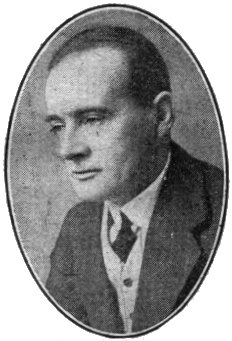Saki
Saki refers to the pen name used by Hector Hugh Munro, a British writer known for his witty, mischievous and sometimes macabre stories. Born on December 18, 1870, in Akyab, British Burma (now Sittwe, Myanmar), Munro's writing career spanned from the late 19th century into the early 20th century, until his death on November 14, 1916. Saki's work is often compared to that of Oscar Wilde and Lewis Carroll for its satirical and fantastical elements.
Biography[edit | edit source]
Hector Hugh Munro was born to Charles Augustus Munro, an Inspector General for the Indian Imperial Police, and Mary Frances Mercer, the daughter of an admiral in the British Royal Navy. After the death of his mother in 1872, Munro was sent to England with his siblings and raised by aunts who are often depicted as figures in his stories. His education at Pencarwick School in Exmouth and Bedford Grammar School provided a classical foundation that influenced his writing.
Munro's early career was in the Indian Imperial Police in Burma, but he returned to England due to health issues. He then pursued writing, publishing his first book, The Rise of the Russian Empire, a historical work, in 1900. However, it was his short stories, written under the name Saki, that garnered him fame. These stories often satirized Edwardian society and politics, featuring a sharp wit and a dark sense of humor.
Literary Career[edit | edit source]
Saki's literary output includes several collections of short stories, including Reginald (1904), Reginald in Russia (1910), The Chronicles of Clovis (1911), Beasts and Super-Beasts (1914), and The Toys of Peace (1919), published posthumously. His stories often feature animals that speak and interact with humans, leading to humorous or unsettling conclusions. One of his most famous stories, "The Open Window," exemplifies his talent for the unexpected twist ending.
In addition to short stories, Saki wrote a full-length play, The Watched Pot, in collaboration with Charles Maude; two one-act plays; and a novel, The Unbearable Bassington (1912), which is considered by some to be semi-autobiographical. His work was influenced by the early deaths of his mother and siblings, his upbringing by strict aunts, and his experiences in Burma and the Balkans as a journalist.
Death and Legacy[edit | edit source]
Saki's life was cut short during World War I, where he served in the Royal Fusiliers. He was killed by a German sniper's bullet in the Battle of the Ancre in 1916. His last words, reportedly, were "Put that bloody cigarette out!"
Despite his relatively short life, Saki's influence on English literature is significant. His stories have been adapted for radio, television, and the stage. The wit and macabre humor found in his work have inspired many writers, and his stories continue to be read and appreciated for their sharp critique of society and human nature.
Selected Works[edit | edit source]
- Reginald (1904)
- Reginald in Russia (1910)
- The Chronicles of Clovis (1911)
- Beasts and Super-Beasts (1914)
- The Unbearable Bassington (1912)
- The Toys of Peace (1919)
See Also[edit | edit source]
This article is a literature-related stub. You can help WikiMD by expanding it!
Search WikiMD
Ad.Tired of being Overweight? Try W8MD's physician weight loss program.
Semaglutide (Ozempic / Wegovy and Tirzepatide (Mounjaro / Zepbound) available.
Advertise on WikiMD
|
WikiMD's Wellness Encyclopedia |
| Let Food Be Thy Medicine Medicine Thy Food - Hippocrates |
Translate this page: - East Asian
中文,
日本,
한국어,
South Asian
हिन्दी,
தமிழ்,
తెలుగు,
Urdu,
ಕನ್ನಡ,
Southeast Asian
Indonesian,
Vietnamese,
Thai,
မြန်မာဘာသာ,
বাংলা
European
español,
Deutsch,
français,
Greek,
português do Brasil,
polski,
română,
русский,
Nederlands,
norsk,
svenska,
suomi,
Italian
Middle Eastern & African
عربى,
Turkish,
Persian,
Hebrew,
Afrikaans,
isiZulu,
Kiswahili,
Other
Bulgarian,
Hungarian,
Czech,
Swedish,
മലയാളം,
मराठी,
ਪੰਜਾਬੀ,
ગુજરાતી,
Portuguese,
Ukrainian
Medical Disclaimer: WikiMD is not a substitute for professional medical advice. The information on WikiMD is provided as an information resource only, may be incorrect, outdated or misleading, and is not to be used or relied on for any diagnostic or treatment purposes. Please consult your health care provider before making any healthcare decisions or for guidance about a specific medical condition. WikiMD expressly disclaims responsibility, and shall have no liability, for any damages, loss, injury, or liability whatsoever suffered as a result of your reliance on the information contained in this site. By visiting this site you agree to the foregoing terms and conditions, which may from time to time be changed or supplemented by WikiMD. If you do not agree to the foregoing terms and conditions, you should not enter or use this site. See full disclaimer.
Credits:Most images are courtesy of Wikimedia commons, and templates, categories Wikipedia, licensed under CC BY SA or similar.
Contributors: Prab R. Tumpati, MD

